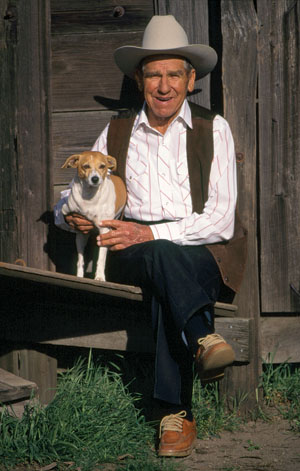Tom Dorrance is a thread that’s woven throughout the fabric of my horse life. My first exposure to his training genius came almost 40 years ago, though I didn’t realize it at the time.

It was 1978, and I’d just bought a green-broke 3-year-old Quarter Horse filly. Liberty Belle Reb was an attractive, Rebel Cause-bred sorrel with a sweet disposition and a doll’s head. To further her education, I sent her to Gary Baumer, then a young northern California trainer I knew from our 4-H days together. (He would go on to win the World Championship Snaffle Bit Futurity in 1984 on Plumb Dry, a son of Dry Doc.)
The first time I watched Gary in action with my filly, what I saw surprised me. Unsaddled, Reb was moving back and forth in a round pen, responding to the trainer’s body language reinforced with the coiled riata he held in one hand. The purpose, Gary told me, was to get “connected” to the filly, get inside her head. That was the starting point of training, he said.
“Oh,” I replied. It was all new to me.
Tom ’n Ray. Baumer had picked up the technique from Ray Hunt–Tom Dorrance’s influential protégé, I would later learn. At the time I was just beginning my career in equine journalism, and in 1981 I drove down to central California to watch Ray Hunt gentle a wild colt at the Fresno Livestock Symposium. What he did that day was unlike what most of us in the audience had ever seen before. It was astonishing.
Fast-forward a few years. In 1997, during an early gig freelancing for Horse&Rider, I met Tom Dorrance at his home in Salinas, California, to interview him for a profile. I was—no other way to put it–gobsmacked by him, as awed by his understanding of human nature as by his genius with horses. He made an extraordinary connection with my then 2 ½-year-old daughter, and I could see why people often described him in mystical terms—to his discomfort. “In his mind, he’s definitely not a guru,” I would later write. “He’s simply the horse’s friend.”
For competitors, too. The next year, 1998, I was in Reno, Nevada, to watch Greg Ward claim the most inspirational victory I’ve ever seen. He won his fourth Snaffle Bit Futurity championship in spite of end-stage cancer that would kill him two months later. Ward had incorporated much of Dorrance’s philosophy in order to “train horses from the heart,” as Greg put it. Clearly, I decided, Dorrance’s “natural horsemanship” methods had as much to offer competitive horsemen as they did the novice owner.
In 2003, the same year Dorrance died at the age of 93, I began writing The Riding Family, a monthly H&R column that chronicled my experiences introducing my daughter to horses and riding. Title of the first one? “Thinking Like Tom” (July 2003). In it, I told how I nudged my then 8-year-old daughter to consider the horse’s perspective, as Tom would, to solve a fear problem she was having with a lesson mount. (It worked.)
Sea change. In 2005, I wrote an H&R special report on The Revolution in Horsemanship, a book documenting the rise and spread of “natural” training methods. It delighted me to see the authors crediting Dorrance as the catalyst for the growing acceptance of these noncoercive ways of relating to a horse. “Modern horsemen may not agree on much,” they wrote, “but virtually all of them agree that this revolution began with a cowboy by the name of Tom Dorrance.”
And that brings us to today. My latest Dorrance-related article, “Changing the Way We Train,” is in the February 2015 issue of Horse&Rider, on newsstands now. In it, I look at some of the ways the teachings of this peerless horseman continue to influence the world of performance horse training. Through the eyes of such top professionals as Craig Johnson, Sandy Collier, Jon Roeser, and Sheila Varian, we see how Dorrance’s way of working with a horse’s nature while honoring the animal’s spirit is still penetrating the horse world.
And, as the great man’s influence continues to resonate, I’ll continue to watch it. That’s a thread that’s unlikely to break.






